15 Blueberry Companion Plants for Healthier Plants, From Herbs to Wildflowers
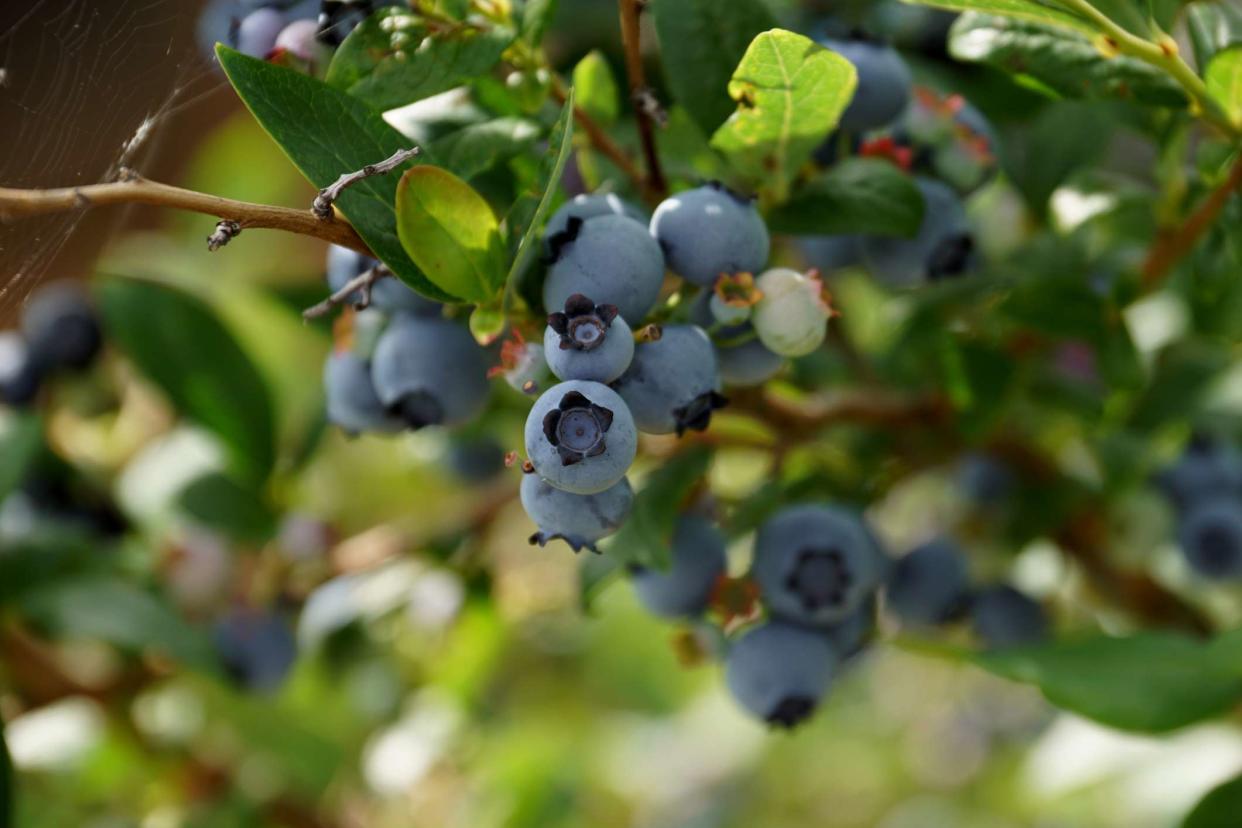
Cathérine / Getty Images
Companion planting is a popular gardening technique that involves growing specific plants near each other to benefit one or both plants. Blueberry companion plants can provide various advantages to encourage growth in your blueberry plants, such as attracting pollinators, retaining soil moisture, and providing essential nutrients like nitrogen. By strategically selecting certain plants to grow alongside your blueberry shrubs, you can also maximize space in your garden and create some visual appeal.
Here are 15 blueberry companion plants that will help foster growth in your garden.
Mint
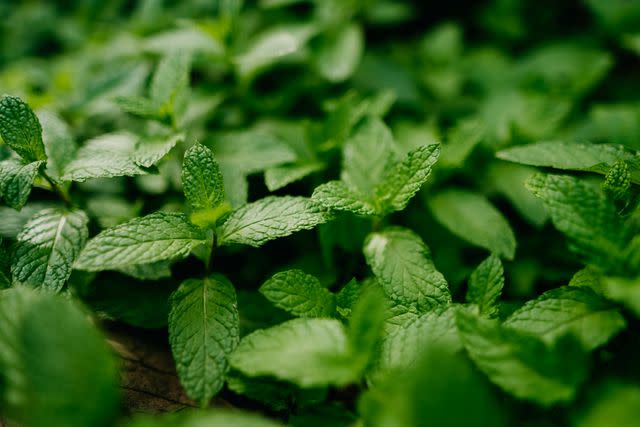
Ana Rocio Garcia Franco / Getty Images
Herbs can be an excellent blueberry companion plant for a variety of reasons. Mint, for example, is an especially aromatic herb, and the scent serves as a repellent for common garden pests like aphids, as well as insects that specifically target blueberry bushes like the blueberry maggot. Mint can also attract bees and other pollinators to help your blueberries grow.
Name: Mint (Mentha spp.)
USDA Hardiness Zones: 3-11
Light: Full sun, partial sun
Soil: Loamy, moist, well-drained
Warning
Although you can grow mint directly beside your blueberry plants, keep in mind it is an invasive herb. Instead of growing mint in your garden bed next to your blueberries, consider growing it in pots nearby.
Cranberries
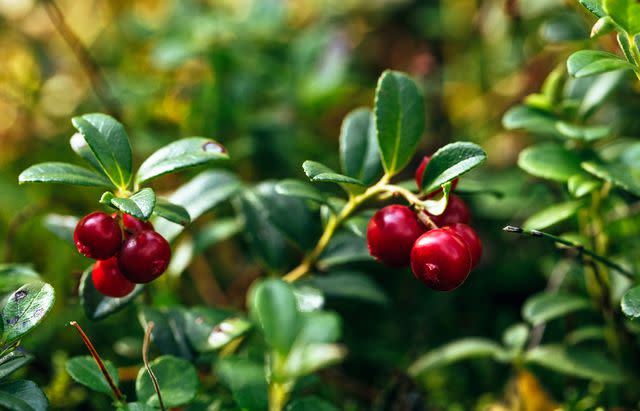
oxygen / Getty Images
As one might suspect, cranberries and blueberries have many similar qualities, including growing conditions. These blueberry companion plants are natural additions to your garden bed, since they also prefer moist, acidic soil. In fact, there is some evidence that blueberries and cranberries planted together can encourage one another's growth.
Name: Cranberry (Vaccinium spp.)
USDA Hardiness Zones: 4-7
Light: Full sun
Soil: Rich, acidic, well-drained
Borage
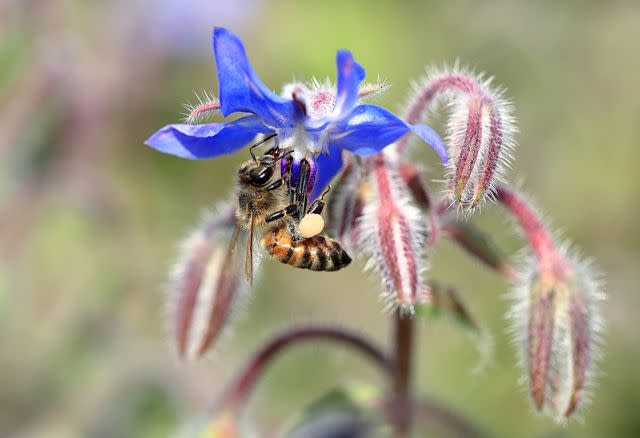
© Jackie Bale / Getty Images
While borage is a lesser known herb, it too can provide ample benefits for your blueberry bushes. This edible flower is a favorite of beneficial insects like ladybugs, as well as pollinators like wasps which can help your blueberry plants grow plump, juicy fruit. Some research indicates that borage can even foster growth in neighboring plants by adding trace minerals to the soil.
Name: Borage (Borago officinalis)
USDA Hardiness Zones: 2-11
Light: Full sun, partial sun
Soil: Well-drained, acidic
Sage
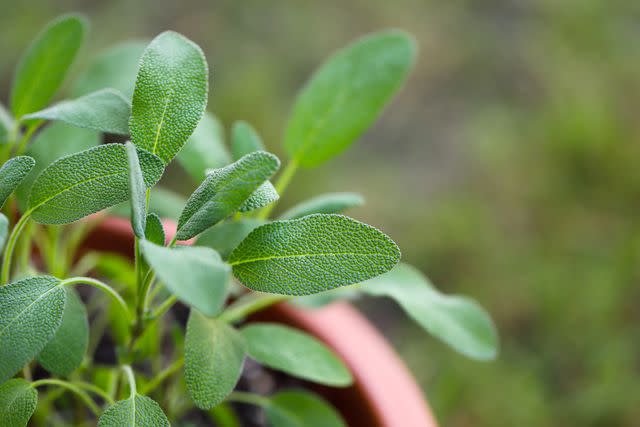
Daniela Duncan / Getty Images
Sage is an excellent blueberry companion plant. Its vibrant flowers not only attract beneficial pollinators, but they also emit an intense aroma that deters common garden pests, such as flies, moths, and black flea beetles.
Name: Sage (Salvia officinalis)
USDA Hardiness Zones: 4-10
Light: Full sun
Soil: Loamy, sandy, well-drained
Tip
Sage typically grows best in well-draining, alkaline soil, but it can thrive in acidic soil as well.
Ferns
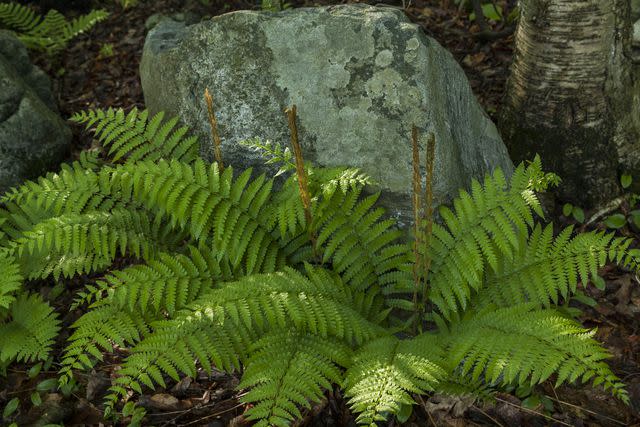
scarletsails / Getty Images
Several ferns, such as the cinnamon fern and royal fern, grow well in acidic soil, and blueberry plants enjoy the same soil conditions. Additionally, both ferns and blueberries are thirsty plants, and since blueberry plants have fairly shallow root systems, ferns can provide shade to help maintain moisture in the soil. As an added bonus, the delicate texture of the fern fronds provides an aesthetic compliment to the blueberry bush.
Name: Fern
USDA Hardiness Zones: 2-10
Light: Full sun, full shade
Soil: Rich, well-drained
Warning
Although both blueberry plants and ferns like moisture, make sure your soil is well-draining to avoid root rot.
Lemon Balm
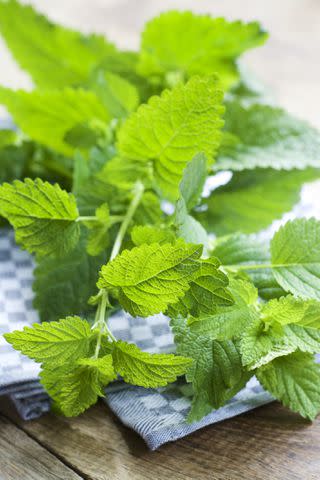
Westend61 / Getty Images
Lemon balm can be an excellent blueberry companion plant for many of the same reasons as mint. In fact, these two fragrant herbs are members of the same plant family, offering many benefits such as luring pollinators and repelling harmful insects. That said, lemon balm can also be invasive, so consider growing this herb in pots near your blueberry plants.
Name: Lemon balm (Melissa officinalis)
USDA Hardiness Zones: 3-7
Light: Full sun, partial shade
Soil: Well-drained
Strawberries
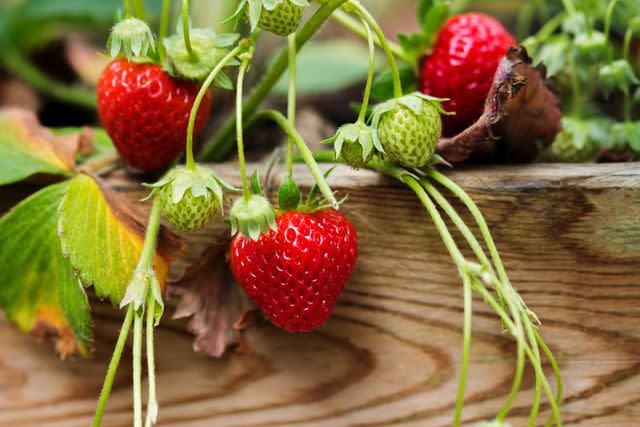
Helaine Weide / Getty Images
Like cranberries, strawberry plants share many of the same soil requirements as blueberries, including acidic soil and consistent water. Additionally, since both plants have relatively shallow root systems, they won't steal nutrients from one another.
Name: Strawberry, garden strawberry (Fragaria x ananassa)
USDA Hardiness Zones: 4-9
Light: Full sun
Soil: Loamy, well-drained
Onions
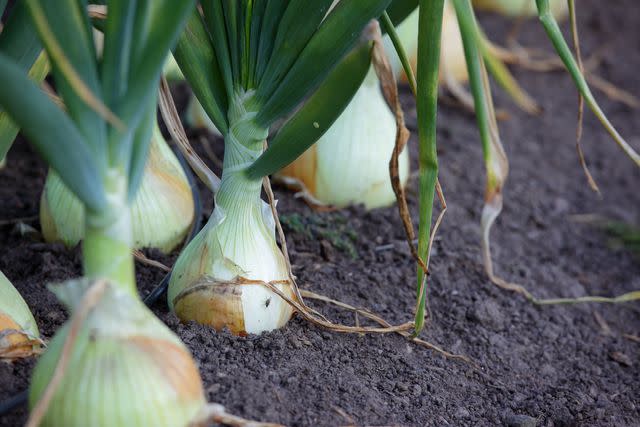
DaveAlan / Getty Images
Onions are beneficial blueberry companion plants for similar reasons as many fragrant herbs like mint and lemon balm. These popular veggies have an intense odor that many garden pests dislike. Plant onions and other alliums near your blueberries to repel insects like Japanese beetles and aphids, and even larger threats like deer.
Name: Onion (Allium cepa)
USDA Hardiness Zones: 5-10
Light: Full sun
Soil: Loamy, well-drained
Heather
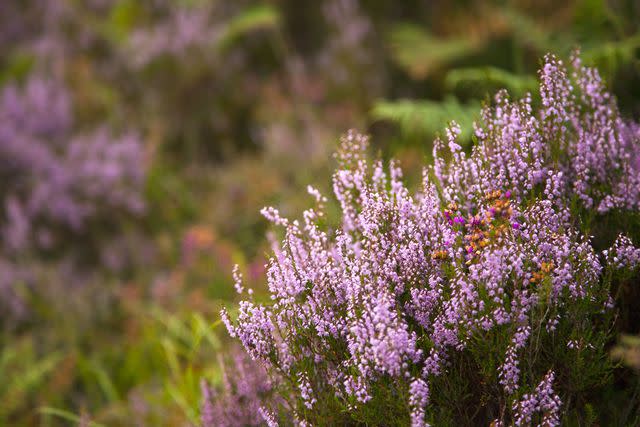
Massimo Ravera / Getty Images
Heather is a popular ornamental shrub with tiny leaves and flowers, but it's also closely related to blueberry plants. Heather and blueberry plants have similar needs, like exposure to full sun and a preference for well-draining, acidic soil, making the two an excellent pair in your garden. For a cherry on top, the petite flowers will add a fun pop of color.
Name: Heather (Calluna vulgaris)
USDA Hardiness Zones: 4b-6a
Light: Full sun, partial sun
Soil: Sandy
Basil
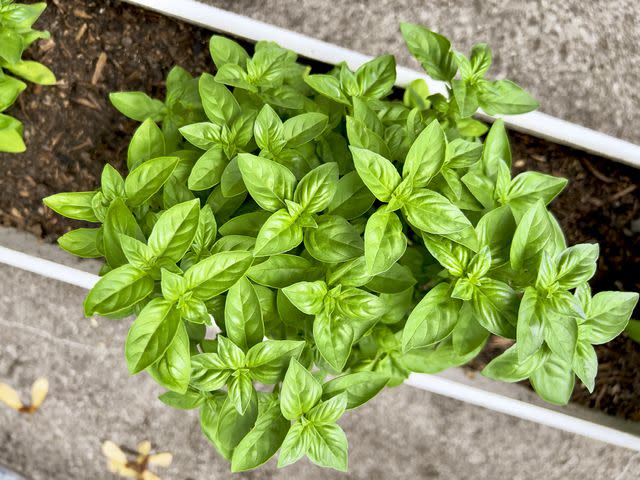
Feifei Cui-Paoluzzo / Getty Images
Basil is another fragrant herb that will not only attract beneficial bugs and keep common garden pests away from your blueberries, but it won't compete with your blueberry bushes for nutrients in the soil. Basil can easily adapt to the soil conditions of blueberry plants as well and will provide a layer of shade around the base of your blueberry plant to help retain moisture.
Name: Sweet basil (Ocimum basilicum)
USDA Hardiness Zones: 10-11
Light: Full sun
Soil: Somewhat rich
Other Blueberry Plants
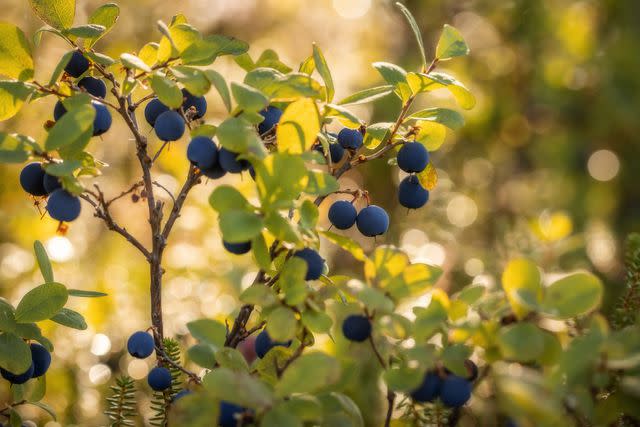
rbkomar / Getty Images
Many blueberry plant varieties are self-pollinating, but one of the tricks to producing big, plump blueberries is planting two or more types of blueberry bushes together. Cross-pollinating your blueberry plants can help increase your yield and produce the tastiest berries for all your summer treats.
Name: Blueberry (Vaccinium spp.)
USDA Hardiness Zones: 3-9
Light: Full sun
Soil: Sandy, well-drained
Rhododendrons
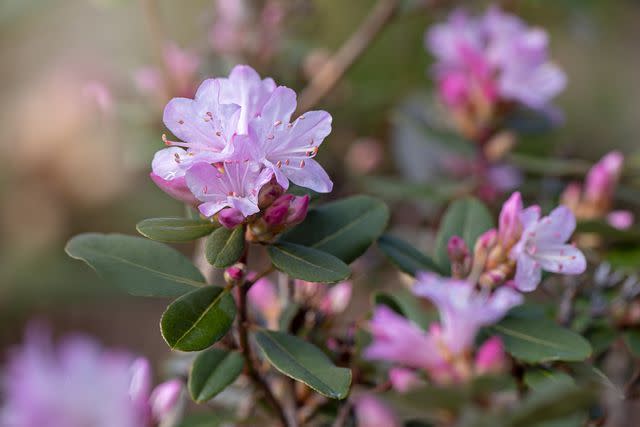
Jacky Parker Photography / Getty Images
Like heather, rhododendrons are another flowering shrub that pairs well with blueberry bushes in the garden. For one, these beauties share with blueberry plants a love of acidic soil and full sun. Their vivid blooms can also add some aesthetic appeal in your garden, and they tend to bloom around the same time of year that blueberry plants flower, which can boost pollinator activity.
Name: Rhododendron (Rhododendron spp.)
USDA Hardiness Zones: 4-9
Light: Partial sun
Soil: Moist, well-drained
Thyme
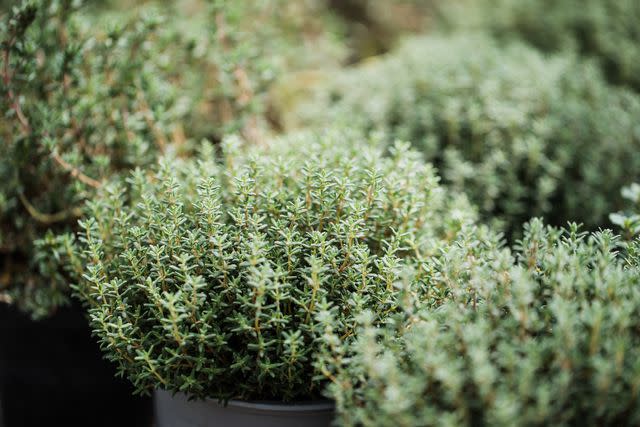
Anna Mardo / Getty Images
Like many of the aromatic herbs mentioned so far, thyme is an excellent blueberry companion plant for multiple reasons. It draws beneficial insects like parasitic wasps to the garden, which can protect your blueberries by warding off pests. Certain varieties of thyme can also provide a form of groundcover for blueberry plants to help retain moisture and prevent weeds.
Name: Thyme (Thymus vulgaris)
USDA Hardiness Zones: 5-9
Light: Full sun
Soil: Loamy, sandy
Bee Balm

bgwalker/ Getty Images
To create the best growing conditions for blueberry bushes, you need a few key ingredients like acidic soil and ample sun. Another necessity is frequent visits from pollinators like honeybees and wasps. Planting a series of native wildflowers, like bee balm, can help attract these beneficial bugs and encourage growth on your blueberry bushes.
Name: Bee balm (Monarda spp.)
USDA Hardiness Zones: 3-9
Light: Full sun, partial sun
Soil: Rich, moist
Chives
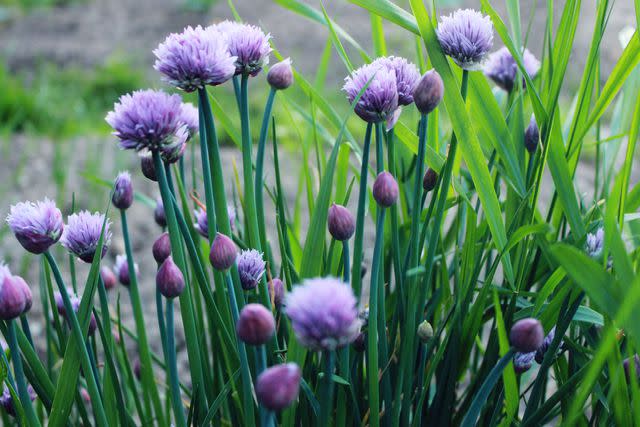
Jasenka Arbanas / Getty Images
Chives are another member of the allium family, like onions. This delicious vegetable not only deters harmful insects with its pungent aroma, but it also produces stunning purple flowers which can help lure pollinators to your garden and increase blueberry production.
Name: Chive (Allium schoenoprasum)
USDA Hardiness Zones: 3-9
Light: Full sun, light shade
Soil: Loamy, sandy
Plants You Shouldn't Grow With Blueberries
Although there are a number of fragrant herbs and flowering shrubs that can encourage growth in your blueberry bushes, not every plant will help your blueberries grow big and juicy. In fact, there are several plants you should avoid growing with blueberry shrubs, including the following:
Nightshades: Nightshades include vegetables like tomatoes, peppers, and eggplant, and while they too enjoy full sun, they do not like acidic soil, making them poor companions for your blueberry bushes.
Brassicas: Brassica vegetables include broccoli, cabbage, kale, and more, and these veggies are not great blueberry companion plants, because they demand a lot of nutrients and water. Additionally, they do not share the same soil preferences as blueberry shrubs.
Grasses: Some gardeners enjoy planting ornamental grasses as groundcover in their gardens, but you should avoid growing grasses near blueberry shrubs, as they can overpower the plants and suck up necessary nutrients.
Frequently Asked Questions
What do you put around blueberry bushes?
There are many different flowers, herbs, and vegetable plants you can arrange around blueberry bushes. However, it's important to note the nutrient requirements of those plants, the soil composition they require, and other factors to ensure that the plants don't inhibit one another's growth.
What is the best pollinator for blueberries?
Bees are the primary, and arguably the best, pollinator for blueberry plants.
Where is the best place to plant blueberries?
The best location for your blueberry shrubs is one that receives full sun throughout the day and one in which the soil is acidic and well-draining.
Read Next: How to Grow & Care for Blueberries in Containers
Read the original article on The Spruce.

